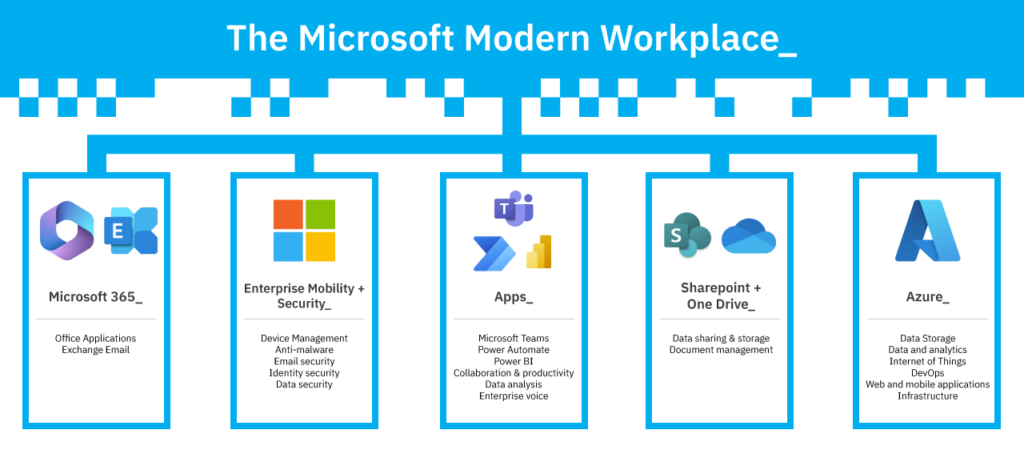As businesses evolve, it is very easy for their business technology and processes to quickly become out of date. Even more so in today’s rapidly changing world of data and AI. Outdated solutions then lead to inefficient operations that negatively impact customer experience and profit margins. Everything your business doesn’t want.
The Workplace Evolution published by Harvard Business Review found that 78% of senior executives in enterprise businesses believe fostering a modern workplace strategy is essential. However, only 31% think their company is forward-thinking enough to do so – meaning the majority are left coping with the consequences of their outdated infrastructure. Changing a fixed mindset into a forward-thinking one within any business is no easy task. With the new normal of remote working stemming from the pandemic, many businesses have had to undergo rapid transformation over the past few years. And Microsoft’s Modern Workplace technology has been crucial in enabling the transformation.
The Microsoft Modern Workplace supports organisations with leading technology that enables employees to work smarter, be more productive, collaborate with remote teams and reap many other benefits.
What’s included in the Microsoft Modern Workplace?
The Microsoft Modern Workplace operates using the suite of Microsoft 365 technologies and productivity applications that harness the power of the Cloud. Microsoft 365 includes well-known solutions, including:
- Office 365 and Exchange email
- Enterprise Mobility + Security, including device management, anti-malware, email security and data security
- Apps for collaboration and productivity, data analysis and Enterprise Voice
- SharePoint and OneDrive for data sharing, storage and document management
- Azure including data and analytics, Internet of Things, DevOps, web and mobile applications and infrastructure.
With the Microsoft Viva suite of tools, communication tools can now be embedded into the daily workflow of your people. Covering Enterprise Social, OKR management and workplace analytics and feedback.
Each solution is designed to support modern ways of working, help facilitate digital transformation, and most importantly keep your business secure.

Microsoft Modern Workplace applications improve employee productivity and satisfaction by creating seamless communications across the business. They also promote collaboration while maintaining the security and integrity of systems and data for a modernised approach to working.
What is a Modern Workplace?
We’ve told you what’s included in Microsoft’s Modern Workplace, but what is a “modern workplace”? Simply put, it’s an operational setup which has been professionally designed to meet both the physical and technological needs of both your business and its employees.
It should account for the challenges facing your business in the modern world, with agile tools and processes that enable you to move forward uninhibited. In today’s data-driven world, this means making the most of automation and insight to improve productivity and make better decisions.
By utilising the latest technology to power and streamline business operations, you can empower employees to do their best work around the clock, wherever and whenever.
How does the Microsoft Modern Workplace facilitate automation?
Automation is a crucial part of any modern workplace, enabling optimised processes across the organisation.
Within Microsoft suite of tools is Power Platform, which includes a range of low-code solutions to support process automation, application development and BI reporting – all backed by Microsoft Copilot. Power Automate enables you to implement both Digital and Robotic Process Automation (RPA) across the business.
By automating tasks you can quickly boost productivity, giving employees more time to focus on innovation than administrative tasks.
You can also automate time-consuming tasks using the built-in AI capabilities and integrate with over 100 applications such as Microsoft Dynamics 365, Twitter, MailChimp, Google Analytics etc. So you can get automation tailored to your needs and reclaim precious time.
AI capabilities also extend to AI authoring, allowing the end user to create, edit and extend existing flows utilising language, with further functionality to utilise AI to create actionable insights.
How does the Microsoft Modern Workplace promote collaboration?
When internal and external teams come together and collaborate to solve a problem, the magic happens.
But facilitating collaboration can prove tricky especially with remote/shift workers or multi-site offices. Research from Gartner found that nearly half of digital workers don’t have access to the data and information they need to succeed, showing just how crucial sharing and collaborating across teams is.
Fortunately, the collaboration applications included within the Microsoft Modern Workplace – such as Microsoft Teams, Office 365 applications and SharePoint – enable employees to easily work together on documents no matter their location. Windows 365 takes this even further by allowing users to access their desktop from any device.
We can’t forget everyone’s remote-working favourite Microsoft Teams. With new features consistently being added to improve accessibility and user experience so teams can come together even in the hybrid world.
Now backed with the power of Microsoft Copilot, Teams enables users to optimise their workflow and stay connected in the hybrid world.
This raises morale, improves efficiency and enables people within different teams to come together. The more flexible it is for employees to collaborate, the more collaboration will occur and the rewards you’ll reap.
How secure is the Microsoft Modern Workplace?
All Microsoft Applications are highly secure. Microsoft Security is also a leader in five Gartner Magic Quadrants.
Within Microsoft 365, the security stack gives us the insights to proactively defend against advanced threats, such as malware, phishing, and zero-day attacks as well as identity, app, data, and device protection with Azure Active Directory, Microsoft Intune, and Windows Information Protection.
The full suite of intelligent security products, backed by Microsoft Security Copilot include:
- Microsoft Defender: Depending on your licensing package, this includes Microsoft Defender XDR, Microsoft Defender for Cloud and Microsoft Defender for Business. All these products provide comprehensive threat protection, detection and response capabilities.
- Microsoft Sentinel: Combined with Defender XDR, Sentinel provides organisations with a unified Security Operations platform that extends security prevention, detection and response with a unified Security Information and Event Management (SIEM) solution.
- Microsoft Entra: Entra provides enhanced identity and access controls to your organisation. Covering AAD, ID governance, verified IDs and network access management controls.
- Microsoft Purview: This solution lets you understand and govern your data, providing greater visibility and safeguarding controls. The tools are designed to improve risk and compliance posture.
- Microsoft Priva: this suite of tools allows organisations to store, process and remove PII data to ensure compliance with regulations such as GDPR.
- Microsoft Intune: Intune is designed specifically to help businesses manage and secure all their endpoints in one central location. This includes cross platform endpoint management and Mobile Application Management to enforce a zero-trust security posture.
Why should you adopt a Modern Workplace?
In the last few years, businesses have faced unprecedented challenges, including tackling remote working, increased demand for data and the tidal wave of AI. All of these have required them to modernise to retain their edge.
if you opt for a traditional set up over a solution like Microsoft’s Modern Workplace, here are some of the pitfalls you’ll face:
- Disparate communication channels. Employees communicate through a variety of different channels. This causes messages to get lost in translation (or entire teams to get out of the loop). But the Modern Workplace can provide visibility and control across your entire organisation’s communication.
- Stand-alone platforms. In a traditional setup, business management platforms are often implemented that have very limited integration and automation with each other. This makes the risk of error high and increases workload, while productivity fails.
- Data and team silos. Teams have a habit of working in silos with limited visibility to other parts of the business, especially in a hybrid environment. Data is stored in numerous locations and access is restricted due to the setup. It means opportunities are missed and collaboration fails.
- Remote working. In the traditional workplace, Desktop PCs are commonly used. Not all employees have access to laptops or tablets which disables remote working, which is often seen as a must-have in today’s world. You risk losing talent and dissatisfying existing staff.
- Technology. Outdated has scalable limitations and won’t completely meet the needs of your employees. By switching to modern technology, you’ll improve agility, productivity and growth potential.
- Security. Traditional workplace infrastructure has limited or no device or cyber security management in place. This puts your business (and your customers) at risk in the event of a breach.
By switching to the Microsoft Modern Workplace, you’ll protect your business against future threats, increase scalability and keep everything working as one well-oiled machine.
Infinity Group are one of only few Microsoft Cloud Solutions Partners in the UK. This means we can confidently support your organisation across all areas of the Microsoft Cloud – Azure, Dynamics 365 and Microsoft 365. If you’re interested in implementing Microsoft Modern Workplace for your business or would like some professional advice on where to start, please get in touch or read more here.




